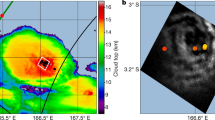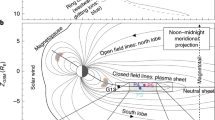Abstract
ON September 6, 1968, in the course of a balloon flight designed to test our theory1 that magnetospheric electric fields could be measured at balloon altitudes, we observed electric fields much larger than any we have ever observed in fair weather and which we usually attribute to thunderstorms, during the time that a rainstorm occurred under the instrumentation; however, various observations show that no lightning was being generated within any reasonable distance from our observations.
This is a preview of subscription content, access via your institution
Access options
Subscribe to this journal
Receive 51 print issues and online access
$199.00 per year
only $3.90 per issue
Buy this article
- Purchase on Springer Link
- Instant access to full article PDF
Prices may be subject to local taxes which are calculated during checkout
Similar content being viewed by others
References
Kellogg, P. J., and Weed, M., Planetary Electrodynamics (edit. by Coroniti, Samuel C., and Hughes, James), 2, 431, Gordon and Breach, Editors 1969.
Holzer, R. E., and Saxon, D. W., J. geophys. Res., 57, 207 (1952).
Anderson, F. J., and Freier, G., J. geophys. Res. 74, 5390 (1969).
Gunn, R., Terr. Magn. Atmos. Elec. 40, 79–106 (1935).
Author information
Authors and Affiliations
Rights and permissions
About this article
Cite this article
WEED, M., KELLOGG, P. Strong electric fields above an ordinary rain cloud. Nature 249, 134–135 (1974). https://doi.org/10.1038/249134a0
Received:
Issue Date:
DOI: https://doi.org/10.1038/249134a0
Comments
By submitting a comment you agree to abide by our Terms and Community Guidelines. If you find something abusive or that does not comply with our terms or guidelines please flag it as inappropriate.



